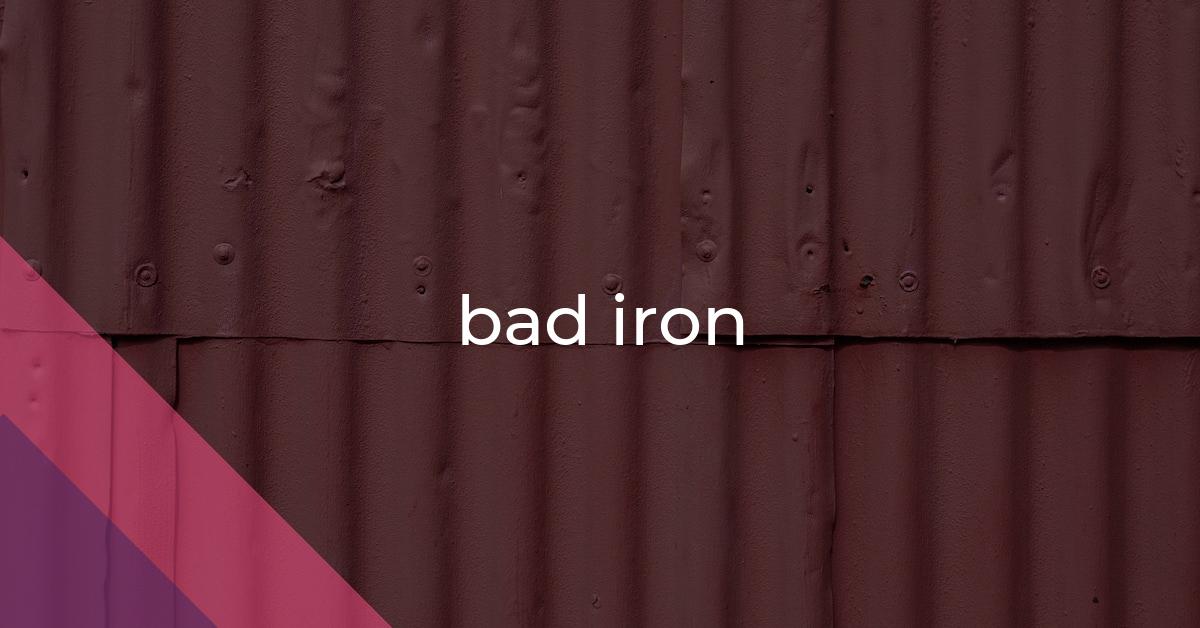bad iron: Idiom Meaning and Origin
What does ‘bad iron’ mean?
The idiom "bad iron" refers to something that is of poor quality or unreliable.

Idiom Explorer
An idiom often used to describe a person who is disliked or considered bad, with negative qualities or behavior.
The idiom "leave something to be desired" means that something is not as good as it should be or as one would expect it to be.
The idiom "irons in the fire" means having multiple projects or tasks in progress or pursuing multiple opportunities at the same time. It suggests being busy with various things and being proactive in pursuing new prospects or ventures.
The idiom "go wrong" means that something does not go as planned or expected, and results in a failure or a mistake.
The idiom "good for nothing" is used to describe someone or something that is completely useless or lacking in any value or purpose.
The idiom "go downhill" means that something is deteriorating or becoming worse over time. It can refer to a decline in quality, performance, or overall condition.
The idiom "fourth-rate" refers to something that is of very low quality or standard, often used to describe a person, product, or organization that is considered inferior or subpar.
The idiom "fifth-rate" refers to something or someone that is of very poor quality or low in performance standard.
Decoding "Bad Iron"
The idiom "bad iron" is a commonly used phrase in the English language. It refers to an object that is flawed or of poor quality. This could be a tool, equipment, or even a person who is unreliable or ineffective. The origin of this idiom is uncertain, but it is believed to have developed from the literal meaning of "iron" as a metal that can be easily rusted or damaged. Over time, the idiom has evolved and acquired a broader range of meanings.
When it comes to tools and equipment, "bad iron" refers to those that are faulty, worn-out, or unable to perform their intended function properly. This usage can be traced back to the early days of industrialization, when the quality of iron used to produce tools and machinery varied greatly. As a result, the phrase "bad iron" came to symbolize anything of poor quality or in an inferior condition. It is important to use reliable and effective tools and equipment, as using "bad iron" can lead to negative outcomes.
Metaphorically, "bad iron" can also describe a person who is unreliable or ineffective. In this context, the idiom suggests that the individual's actions, decisions, or behavior are flawed or detrimental. It implies that their performance falls short of expectations, resulting in negative consequences. Just as "bad iron" tools can make a task difficult or impossible, a person who is "bad iron" can hinder progress or create problems.
The idiom "bad iron" is widely used in both casual and formal contexts. Its versatility allows for a broad range of interpretations, making it applicable to various situations. Whether it is used to describe a faulty object or an unreliable person, the idiom conveys the same message of poor quality or ineffectiveness. It is a useful phrase that allows us to communicate ideas concisely and effectively.
Another related idiom is "bucket of rust," which is used to describe something that is old, deteriorated, and in poor condition. This phrase shares similar connotations with "bad iron" as both refer to objects that have qualities of rust or decay. "Bucket of rust" can be seen as an extension of the "bad iron" idiom, emphasizing the state of disrepair and uselessness.
Similarly, the idiom "rotten egg" can also be related to "bad iron" as it refers to something or someone who is bad, unpleasant, or of poor quality. This idiom is often used to describe someone with a bad reputation or someone who is not trustworthy. Just like "bad iron," "rotten egg" conveys a negative quality or characteristic.
Another related idiom is "in bad odor," which means to be in a state of disapproval or disrepute. This phrase can be used to describe someone who is unpopular or whose actions are not well-regarded. The connection to "bad iron" can be made in terms of the negative perception or reputation that both idioms imply.
Lastly, the idiom "bad joke" can also be connected to "bad iron" as they both involve something that is considered to be of poor quality or ineffective. While "bad joke" specifically refers to a joke that is not funny or fails to elicit laughter, it shares the common theme of ineffectiveness or inadequacy with "bad iron." Both idioms evoke a sense of disappointment or dissatisfaction.
The idiom "bad iron" is a versatile phrase that is commonly used in the English language. It can refer to objects that are of poor quality or in an inferior condition, as well as to individuals who are unreliable or ineffective. The idioms "bucket of rust," "rotten egg," "in bad odor," and "bad joke" are related to "bad iron" in that they share similar connotations of poor quality, ineffectiveness, and negative perception. These idioms allow speakers to convey their message concisely and effectively, adding depth to their communication.
Example usage
Examples of how the idiom *bad iron* can be used in a sentence:
- He inherited a *bad iron* from his grandmother, which constantly burned his clothes.
- The chef complained about the *bad iron* in the kitchen, as it caused inconsistent cooking temperatures.
- She regretted buying a *bad iron* as it leaked water and left stains on her clothes.
More "Mistakes" idioms



